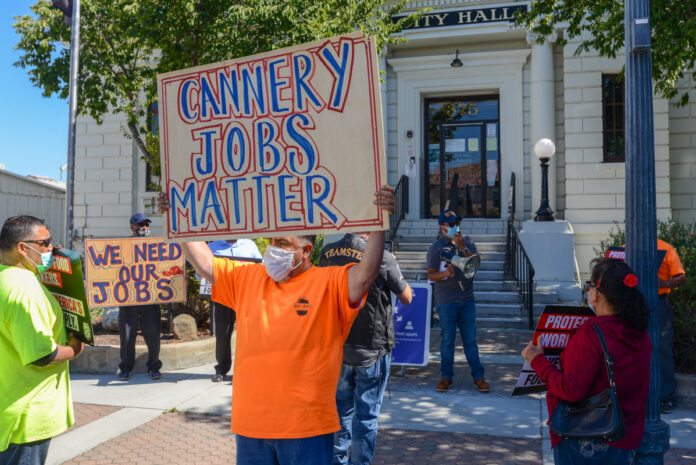
A tentative agreement between San Benito Foods and the City of Hollister will force the downtown tomato cannery to fork over millions of dollars in fees if it wants to continue operating at full capacity, according to city officials. But the cannery manager said the negotiations are ongoing and there is no agreement in place.
Hollister City Manager Brett Miller on Sept. 21 issued a statement that San Benito Foods agreed to the basic terms of the operating permit that the city had previously proposed.
“The city and San Benito Foods are continuing to work together to resolve any remaining issues,” Miller said.
Miller said the cannery, which is located in downtown Hollister, came to an agreement with the city to pay $2.5 million fees so they could obtain an operating permit and help repair an ongoing issue with sludge removal at the wastewater treatment plant.
Hollister Mayor Ignacio Velázquez broke the news on Sept. 15 in a video he posted on Facebook saying that San Benito Foods agreed to pay for all of the costs to remove the sludge. He said San Benito Foods also agreed to make improvements on the water it uses to meet state standards so the city won’t be fined.
“What does that mean? It means we saved all of you taxpayers over $2 million by working with them and making sure they were paying their share of the costs rather than you,” he said.
However, San Benito Food plant manager Sam Humphrey said in an email that they have yet come to a consensus or formal agreement to pay anything to the city.
“There is no agreement,” he said. “The parties are actively negotiating.”
Humphrey said as of now the cannery is in full swing and none of the seasonal workers were laid off. The season will be over in the first or second week of October.
San Benito Foods filed a lawsuit in San Benito County Superior Court earlier this year, alleging the city violated the California Environmental Quality Act and the Brown Act. The company also claimed that the city committed a breach of contract and asked for declaratory and injunctive relief.
San Benito County Superior Court Judge Omar Rodriguez on Aug. 5 ruled against the cannery, stating that the company’s many allegations against the city were not likely to withstand a trial.
In a court filing, San Benito Foods, which is owned by the Neil Jones Food Company based in Vancouver, Wash., accused the city council of “extortion of fees” for removing sludge from pond No. 2 at the city’s industrial wastewater treatment plant. The cannery uses the pond to dispose of its wastewater.
San Benito Foods attorney David Weiland of Fresno-based Coleman & Horowitt LLP mentioned in the past that the fee was illegal and that the burden might force the closure of the cannery, causing irreparable harm to the community by eliminating 450 local jobs.
Weiland said that there was a verbal agreement between the city and cannery that San Benito Foods would pay $25,000 for the annual permit, which had been paid the previous three years.

In June 2017, the City of Hollister wrote to San Benito Foods that it was going to cost $1 million, not $25k, to remove 10 feet of sludge from the industrial wastewater treatment plant during the 2015 season. According to court documents, “a deposit of $25k per year would take about 40 years to build a fund of $1 million for future sludge removal.”
Weiland claimed that the City of Hollister was in violation of both the California Environmental Quality Act and the Brown Act. He also accused the city of committing a breach of contract.
The court stated that San Benito Foods had not satisfied or met the burden of proof, which means the cannery wasn’t sufficiently prepared to argue violations of the Brown Act and CEQA regulations.
The city’s attorney, David Prentice of Prentice Young, gave an argument to why the preliminary injunction should be denied, according to county court documents. He mentioned in the argument how the cannery wasn’t able to pay the $2.5 million in fees to remove sludge, which had built up for more than 70 years.
Rodriguez ultimately ruled that, “for the foregoing reasons, the Petitioner/Plaintiff’s motion is denied.”
During the hearing, Rodriquez said a temporary restraining order signed June 22 that allowed the cannery to begin operations would expire immediately. San Benito Foods was ordered to shut down operations by Aug. 8 unless it paid $2.5 million it owed to the city.
Miller, who was the interim city manager at the time, sent a letter to Humphrey that the city would issue the 2020 operating discharge permit but only if a payment was made by noon on Aug. 7.
The Free Lance asked for a copy of the letter but it was unavailable because the parties are still negotiating and any correspondence is subject to change, according to Humphrey.
“It is important to correct several rumors about the issue between the City of Hollister and San Benito Foods,” Miller said. “First, the city never wished to shut down San Benito Foods or its operation.”
Miller said it’s been an issue that boiled up for several years and it finally came to a head before the season began. The city thinks San Benito Foods should be responsible for the costs associated with its waste water discharge.
Miller said that it’s not true they refused to negotiate with San Benito Foods and that they raised the issue of wastewater discharge for years. He said it was an attempt to obtain a reasonable agreement that would not shift costs onto city taxpayers.
“Those costs should not be carried by the citizens of Hollister,” he said.
Miller also cleared up any rumors that the city wishes to use the property currently occupied by San Benito Foods for any other purpose. He pointed out that they have no reason to let citizens lose their jobs.
“Employment for the citizens of Hollister is always a priority with the city,” he said.









